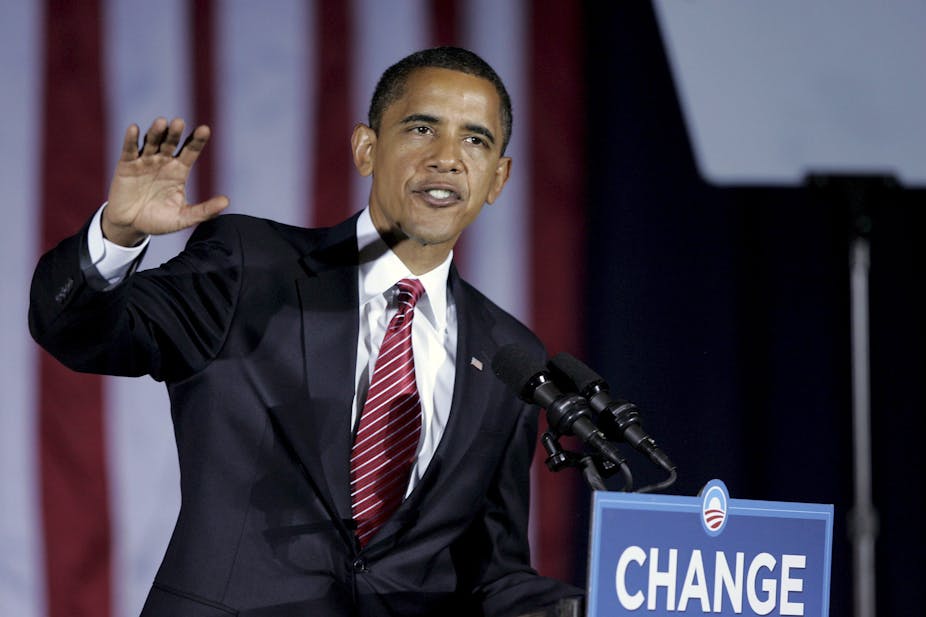With the Democratic National Convention taking place this week in Charlotte, North Carolina, and noted orator Barack Obama set to speak on Friday (Australian time), The Conversation looks at the art of political rhetoric and public speaking.
Mitt Romney and Barack Obama are campaigning against the shadow of Obama’s 2008 campaign as intensely as they grapple with each other.
Obama’s last campaign was so impressive, so innovative, so memorable, that it hangs over all the participants this time around, himself included.
It is especially obvious in the speaking performances. Obama’s 2008 campaign produced far and away the most impressive series of political speeches by an English speaking candidate for office in living memory.
Obama’s “Yes We Can” speeches after losing the New Hampshire primary and after winning the election will resonate for decades at least. His speech on race, “A More Perfect Union”, carried a persuasive force I have not witnessed in another politician during my lifetime.
In 2008, his better-known speeches reached beyond harnessing people’s opinions to try and shape them, educating them. Unlike, say, Julia Gillard or Tony Abbott, you could listen to one of Obama’s speeches and recognise it had made you a more intelligent person for your troubles.
But Obama faces a harder task this time. Partly this is because he won: there is a strong view among political scientists that American presidents achieve very little through their public speeches. Especially influenced by George Edwards, the last two decades have given rise to a theory that campaigners may win elections through mass persuasion, but presidents must govern by targeted negotiation.
Even before his 2008 victory, Obama’s opponents set up a version of the words-versus-deeds test to ensure people would compare his achievements in office with the extraordinary expectations that his speeches made imaginable. Hampered by an intractable Congress, his administration has been unable to close down Guantanamo Bay, unable to make meaningful progress against fossil fuel usage, and unable to initiate any decisive strategy to get America’s economy out of the doldrums. His reforms to healthcare, so hard-fought, have struck commentators outside the USA as falling well short of the safeguards a prosperous system might take for granted.
Of course, in contesting the election, Obama becomes a candidate again. It is just that he is the incumbent candidate. His hands are more tied by both track record and institutional expectations this time.
In 2008, Obama especially impressed with his ability to tame adversity through speeches. The New Hampshire speech was his call for supporters to keep the hope alive when he was clearly not the odds-on favourite to win Democratic Party nomination. It worked, and he went on to defeat Hillary Clinton.
Romney had a similar moment in February this year, after losing the South Carolina primary. He gave a speech of a similar duration, attempting a similar level of crowd engagement and boosterism.
The two concession speeches make a revealing contrast. You get the impression that if the viability of Romney’s campaign were reliant on an impressive speech, he would grit his teeth and do his duty — but the gritted teeth would get noticed and discussed on every channel.
Perhaps now, after the convention, he gets to be the real challenger at last, and this might free him up. (That said, can anything free up Mitt Romney?)
The comparison is a bit misleading, in fairness, because South Carolina was not really a turnaround moment for Romney. He remained the odds-on favourite through the primary campaign. He has had his gaffes, and Republican supporters have been remarkably slow to fall in behind him, but the lack of a genuine crisis has starved his already boring campaign of the drama that might have helped him reach the voters who do not know him. Candidate crises grab attention, then a good speech can put that attention to use.

On the other hand, in this business, fairness is a sideline concern at best. The very fact that Romney has had a mild run, along with the lack of drama his campaign has generated, means people will compare his challenge this year to Obama’s effort last time and they will find Romney wanting.
The lack of test-through-crisis for Romney may change now that he is the Republican Party’s official nominee, though. In the months after the convention, he will increasingly come in for appraisal as a candidate who might become president, especially while the reported opinion polls remain fairly close.
Obama has not had a dramatic turnaround moment in 2012, either, and he may well not get one before the election. That means his 2008 campaign does not only embarrass his record of achievement in office; its memory guarantees his current campaign will underwhelm the electorate. If he wins, that will be largely because voters remember how good they once believed he was, and then decide not to hold that against him.

